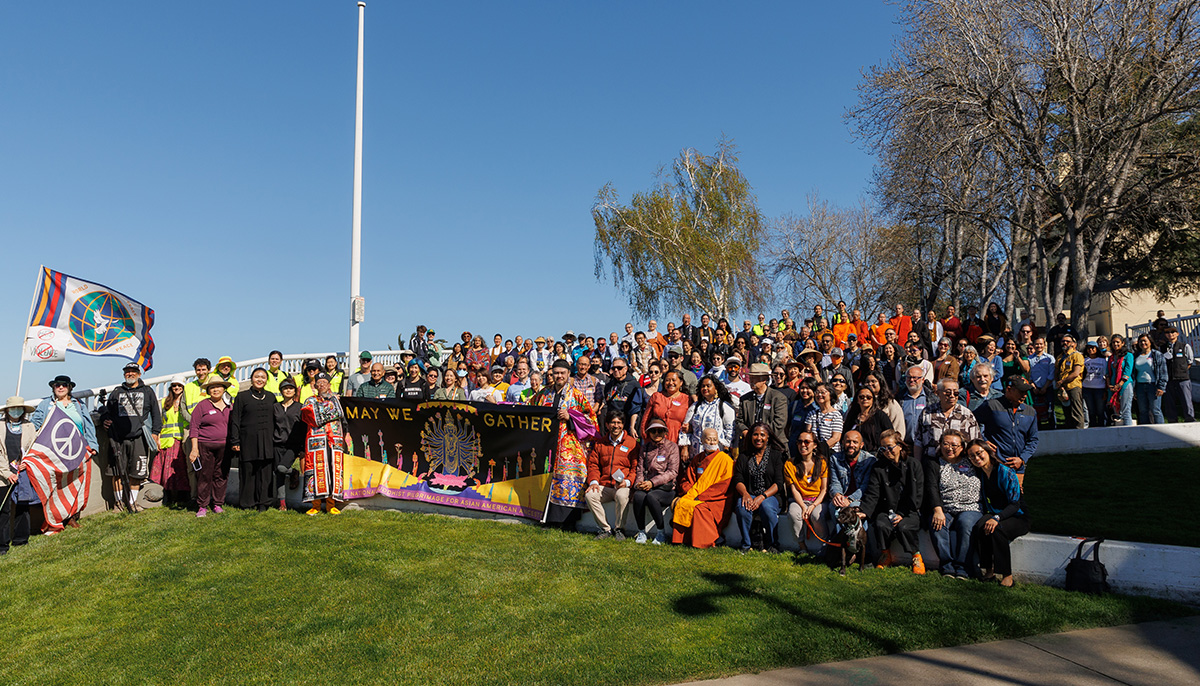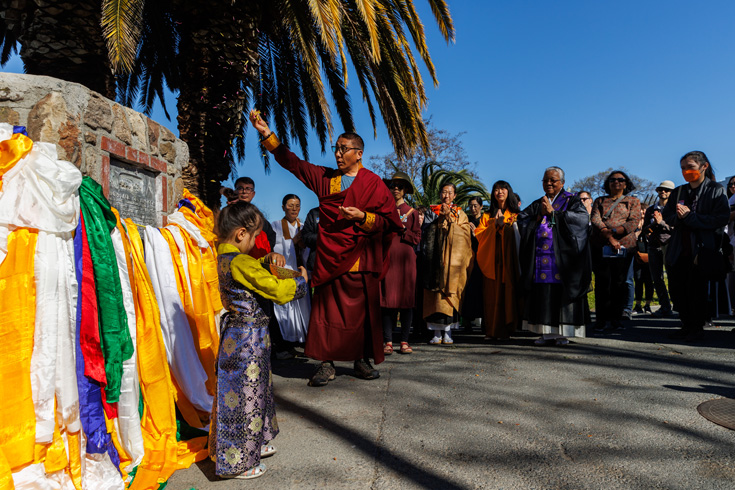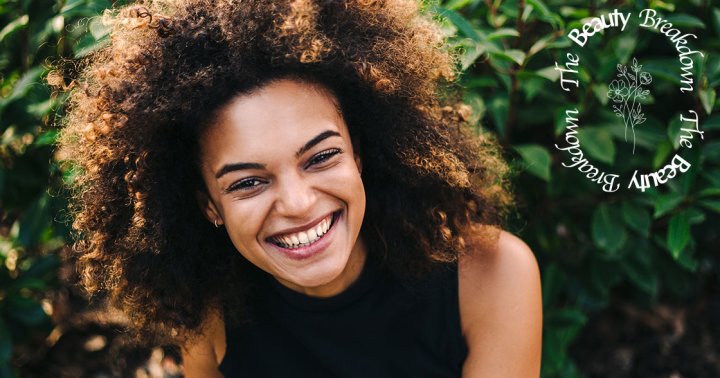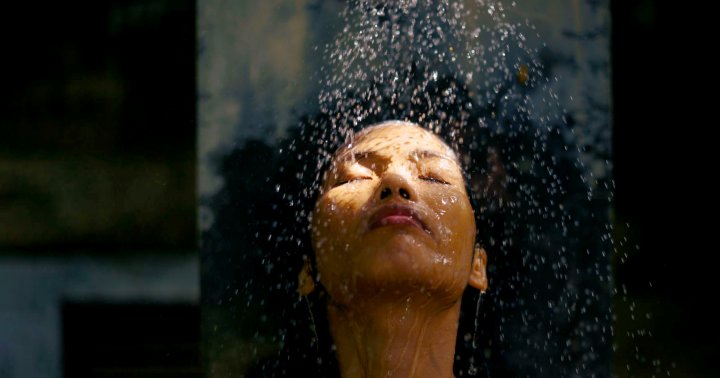“May We Gather” Buddhist memorial and pilgrimage honors Asian American ancestors
Lion’s Roar associate editor Mihiri Tillakaratne reports on the 2024 “May We Gather” event in Antioch, California, which marked the three-year memorial of the Atlanta-area spa shootings. The post “May We Gather” Buddhist memorial and pilgrimage honors Asian American...

A profound and historic gathering took place on Saturday, March 16, 2024, in Antioch, California, as Buddhist communities from across the nation convened for “May We Gather: A National Buddhist Pilgrimage for Asian American Ancestors.” Conceived by co-organizers Dr. Funie Hsu, Chenxing Han, and Rev. Dr. Duncan Ryuken Williams in response to rising anti-Asian violence and vandalism of Asian American Buddhist temples in 2020 and 2021, May We Gather “offers an opportunity for Asian American and other Buddhist communities throughout the United States to come together in mourning, mending, and renewal.”
The first May We Gather event in May 2021 commemorated the 49-day anniversary of the Atlanta, Georgia spa shootings as well as anti-Asian violence throughout U.S. history. The May We Gather collective held other memorials on the 100-day and annual anniversaries, according to Buddhist memorial ritual schedules.
Saturday’s ceremony and pilgrimage, which marked the third anniversary of the Atlanta shootings, was held in Antioch, California, approximately 40 miles northeast of San Francisco. In 2021, Antioch became the first U.S. city to make a formal acknowledgement and apology for its history of anti-Asian discrimination and violence.
 May We Gather organizers (left to right) Funie Hsu, Chenxing Han, and Rev. Duncan Ryūken Williams deliver messages of healing and resilience during the indoor ceremony at the El Campanil Theatre in Antioch. Photo by Juliana Yamada.
May We Gather organizers (left to right) Funie Hsu, Chenxing Han, and Rev. Duncan Ryūken Williams deliver messages of healing and resilience during the indoor ceremony at the El Campanil Theatre in Antioch. Photo by Juliana Yamada.Co-organizer Funie Hsu linked the Atlanta shootings and the 1876 destruction of Antioch’s Chinatown: “We are here because the scapegoating of six Chinese women that incited the burning of Antioch’s Chinatown highlights a parallel to the six women of Asian descent who were blamed and killed in the Atlanta-area spa shootings. This shared connection between these two incidents emphasizes the ongoing legacy of anti-Asian and gender-based violence. It also underscores a context of Christian dominance that has shaped the development of America’s racial karma, and particularly the stereotyping of Asian immigrants as foreign heathens.”
“Together, our voices are a powerful reminder that we are not alone, in suffering and in healing.”
The event included Buddhist rituals and dharma talks representing multiple traditions and a peace walk circumambulating Antioch’s former Chinatown, made up of two square city blocks along the waterfront. During the peace walk, there was a Daoist memorial ritual and an offering of Tibetan blessing scarves at a monument marking the “Birthplace of Antioch,” followed by a community reception.
Katie, a volunteer at event, was moved seeing the multitude of peoples, perspectives, stories, and spaces the event incorporated, especially as a child of Chinese immigrants from Hong Kong. They explained the importance of ceremony in enduring grief, and how events like this help us “acknowledge the connections that we have to one another and to remember, recognize, fortify, and nourish those connections.”
The 90-minute ceremony at the El Campanil Theatre featured Buddhist leaders representing Chinese, Indian, Japanese, Khmer, Korean, Lao, Sri Lankan, Taiwanese, Thai, Tibetan, and Vietnamese Buddhist traditions, chanting and conducting rituals in multiple languages. Buddhist women leaders gave dharma talks on loving kindness, spiritual kinship, the sublime attitudes, interconnection, caste equity, compassion and collective healing, and paths to enlightenment.
 Maria Cassandra Quinto-Collins, Antioch resident and police reform activist, and mother of deceased Angelo Quinto, offers an orchid at the Daoist healing ceremony in Antioch’s Waldie Plaza, guided by Sumo Liu (First Taoism Foundation). Photo by Juliana Yamada.
Maria Cassandra Quinto-Collins, Antioch resident and police reform activist, and mother of deceased Angelo Quinto, offers an orchid at the Daoist healing ceremony in Antioch’s Waldie Plaza, guided by Sumo Liu (First Taoism Foundation). Photo by Juliana Yamada.The stage held an altar with a statue of Guanyin, her many arms holding Buddhist ritual objects. Chenxing Han explained that in gathering before Guanyin, “the all-seeing, all-hearing bodhisattva of mercy central to the religious lives of many early Chinese immigrants,” participants could “build our resilience as a sangha and cultivate fierce compassion and spiritual friendship.”
The altar also held four memorial tablets with the names of Asian American Buddhists killed due to anti-Asian violence: Yong Ae Yue, Vicha Ratanapakdee, Yik Oi Huang, and Sia Bun Ning. A fifth tablet stood for “all people who have lost their lives through racial and religious animus.”
During the ceremony, a kintsugi lotus from the 2021 May We Gather ceremony was offered to the altar. Kintsugi is the Japanese art of repairing broken pottery through gilding. During the 2021 ceremony, Buddhist leaders gilded the cracks in this lotus, so that cracks were still visible but made beautiful.
 May We Gather attendees participate in a walking procession in downtown Antioch led by May We Gather co-organizer, Rev. Duncan Ryūken Williams, and esteemed Buddhist leaders. Photo by Juliana Yamada.
May We Gather attendees participate in a walking procession in downtown Antioch led by May We Gather co-organizer, Rev. Duncan Ryūken Williams, and esteemed Buddhist leaders. Photo by Juliana Yamada.The indoor ceremony concluded with Buddhist leaders and attendees each offering a single flower to Guayin. Taiko drummers performed at the entrance of the theatre as participants made their way outdoors for the walking procession. The procession first stopped in Waldie Plaza, where in 2021, Antioch Mayor Lamar Thorpe issued the historic formal apology. Mayor Pro-Tem of Antioch, Monica Wilson, read the Antioch City Council resolution apologizing “to early Chinese and their descendants for acts of fundamental injustice, seeking forgiveness and committing to rectification of past misdeeds.”
Procession leaders and the family of late Angelo Quinto offered flowers, candles, and food to the altar in a Daoist memorial ceremony honoring all who have lost their lives to racial and religious violence. The Quinto family helped pass police reform laws in California, including the 2021 Assembly Bill 490, “Angelo’s Law.”
When the pilgrimage procession arrived at the Birthplace of Antioch marker, each participant draped Tibetan blessing scarves, or khatas, over it. Rev. Dr. Duncan Ryuken Williams explained how the many colored scarves represented the many types of people that built cities like Antioch. The different colors of light shine together, without canceling each other out, creating a beautiful Pure Land.
 Khenpo Paljor Gyatso (Pure Land of Iowa) leading a Buddhist chant and flower offering, with assistance from Alaya Ueunten, in front of the Birthplace of Antioch marker. Photo by Juliana Yamada.
Khenpo Paljor Gyatso (Pure Land of Iowa) leading a Buddhist chant and flower offering, with assistance from Alaya Ueunten, in front of the Birthplace of Antioch marker. Photo by Juliana Yamada.During the community reception, Khenpo Paljor Gyatso gifted participants with khata scarves. This means participants most likely received a scarf that someone else offered, showing how we are all interlinked. Using the jeweled net of Indra as a metaphor, Rev. Dr. Duncan Ryuken Williams explained: “We are all like individual jewels in this larger net that extends infinitely in every direction. Like cut jewels, we’re like a mirror, so that when we look at one person, we see the reflection of everybody else. That’s the Buddha’s teaching at its core: we are interlinked. Our freedom is interlinked. When we come to learn more about each other, we can work anywhere in that net.”
The event also featured a profound, but unplanned, moment. As Khenpo Paljor Gyatso performed the closing ritual, a train blared in the distance. As soon as he finished chanting, the train came barreling through. For over two minutes, its rumbling coursed through our bodies. I felt chills, tears stinging my eyes, as I thought of the Chinese immigrants who built these railroads, the Japanese Americans who built up California’s agriculture industry yet were taken to internment camps on tracks like these, and the countless others who built our country. This was our ancestors making themselves known. Or, in the words of May We Gather, the train can remind us that, “Together, our voices are a powerful reminder that we are not alone, in suffering and in healing.”
Visit the Lion’s Roar Instagram page to see more photos and video of the event and watch a replay of the “May We Gather” ceremony below:

Mihiri Tillakaratne (she/her) is an associate editor at Lion’s Roar. She has a PhD in Ethnic Studies and Gender, Women, and Sexuality (UC Berkeley), a M.A. in Ethnic Studies (UC Berkeley), and a M.A. in Asian American Studies (UCLA). She learned Pali and studied Sinhala Buddhist nationalism in post-independence Sri Lanka at Harvard. Mihiri is the director of I Take Refuge, a documentary on Sri Lankan American Buddhist identity, and the founder of Sri Lankan Americans for Social Justice.

 Aliver
Aliver 
































